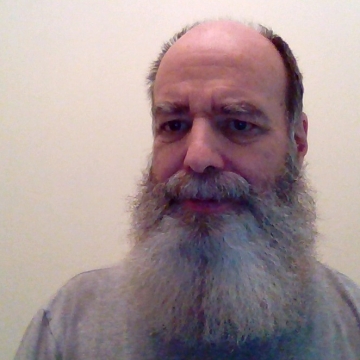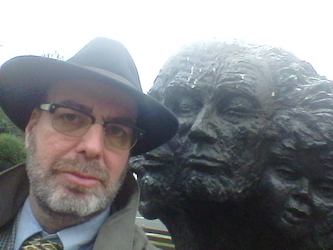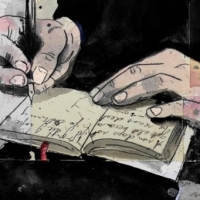February is Black History month! How is that even fair? Black people get a whole month devoted to them, but white people get bupkis — or is that butt kiss, I’m never sure with these things? No matter, we’ll start our celebration of Black History month with a couple of hilarious jokes, so strap in and tickle your funny bone as you prepare to laugh your ass off — wasn’t he just elected to the Senate? See what I mean? It’s just a laugh a minute around here.
How do you get a Black person out of a tree?
Cut the rope!
A viral video forced a wealthy Texas suburb to confront racism. A ‘silent majority’ fought back.
High-larry-us, don’t you agree? How about this one?
Now that Rosa Parks has passed, Black people have to sit at the back of the bus again!
A viral video forced a wealthy Texas suburb to confront racism. A ‘silent majority’ fought back.
Man, Ye Olde Blogge is just on fire here at the beginning of Black History month!
As hard as that racist bullshit is to read, imagine if your child came home and told you that those were things other kids at school were telling them. Imagine the realization that you couldn’t protect your children from the worst ravages of overt racism in your community.
Imagine telling your children, “I’m your mother, and I am supposed to protect you. And I failed you.” It’s heartbreaking. We all know that we cannot protect our children from every harmful thing that is out in the world, but we feel like we should be able to. And, there are only a few stark reminders that we can’t… if you’re white.
If you’re not white, then you are reminded frequently that you cannot protect your child from racism.
The only thing that comes close for white parents is having a child with a disability or mental health issue. So, today Ye Olde Blogge takes a closer look at what makes racism so damaging to Black people in the hopes that we can convince the hold outs among white people that (a) racism is alive and well in the USA, (b) racism is typically expressed in much more subtle ways than we whites imagine, and (c) demonstrate the ways that it damages Black psyches and souls. Sounds like fun, right?
After writing The Civil War Never Ended series on the racism inherent in our deep culture, I got a lot of push back from folks who didn’t think it racism is really a thing. Most white people don’t understand racism. They think it is all lynching and using the n-word. You know, overt hatred of black people, so if you’re not running around spewing racial hatred with a noose hanging out of your back pocket, you’re good. They don’t realize the subtle ways that implicit bias is expressed and influences our behaviors and mental processes. Our deep culture is what makes the Harvard Project Implicit work. If you haven’t taken one of their tests, you should. They are illuminating.
Another window into racist beliefs in our culture is in the “jokes” these children were making. Those ideas didn’t just spontaneously generate in a vacuum. They were picked up from their environment, and who makes up most of a child’s environment? Their parents and their schools. Those kids felt like that shit was normal because it was occurring in their environment with some regularity.
Racism and Traumatic Stress
Racism is a form of bullying. Bullying results in traumatic stress disorders. Exposure to racism results in traumatic stress disorders and numerous others.
Threats to Group Membership
One reason that racism is so debilitating is because it threatens the individuals membership in the larger group. Because the safety and security of great apes and many mammals is predicated on group membership and inclusion, anything that threatens continued membership in good standing is a direct threat to the life and well-being of the individual. You might not think that consciously, but you feel it outside of your consciousness. You have an implicit primitive emotional understanding of the mechanism and will react to it. At its core, racism is the threat of expulsion from the group based on skin color — a trait no one can choose or change. In this sense, all experiences of racism are extremely stressful, and none of them can be brushed aside lightly.
The Effects of Long-Term Exposure to Stress Hormones
When distressed, we produce stress hormones and experience other physiological responses. Long-term exposure to those stress hormones leads to numerous serious health issues like headaches, migraines, and bodily aches and pains; aggravation of respiratory illnesses; increased incidents of cardiovascular disease including heart attacks, high blood pressure, and stroke; and gastrointestinal complications like increased bloating and abdominal pain.
Given that life expectancy is five years shorter in our Black population and that the average age of first heart attack is younger for Blacks, it is reasonable to think that racism is a contributing factor through explicit acts of racism, implicit acts of bias, and systemic racism that consistently denies Black people the same quality of care dollar-for-dollar that white people receive.
Stereotype Threat
Another way that racism affects affects Black people is through stereotype threat as established by Steele, Aronson, and Spencer. The idea is that if you remind someone of their group membership such as gender or racial groups, then ask them to do some high-stakes performance like take an important standardized test, then if their group membership is one that is discriminated against in a specific way, their performance on the test will shift to conform with the stereotype. Hunh? If you give students a standardized test and ask them what their race is immediately before taking it, Black kids will perform worse on the test than Black kids who weren’t asked about their race. It is as if they are conforming to the stereotype that they are stupid as they are so often told they are in subtle and not so subtle ways.
The take away here is that the self concept that we beat into our Black community that they are criminal, lazy, stupid, and other negative characteristics has a tremendous effect on their ability to perform. There is a very real, very permanent effect. It happens outside of our awareness making it insidious and difficult to overcome. Black people really do have to work harder just to achieve the same outcomes as white people.
School-based Racism
Race also affects school performance in two specific ways: (1) teacher expectations based on student characteristics and (2) improvements in student performance when teacher and student are of the same race.
Teacher expectations. It has been well demonstrated that teachers have expectations of their students and that those expectations are based on ethnicity and socioeconomic level. Teachers treat students differently based on their expectations. When expectations are high, teachers give more response time, call-on students more often, give more challenging instruction, more praise, and higher marks for similar work. The opposite was true for teachers with low expectations. Of course, you can guess one of the determinative factors for expectations was race.
Worse, though, is that students from discriminated against ethnic groups were more susceptible to the effects of low expectations. In effect, the internalized racial bias caused teachers to worsen their educational conditions limiting their achievements proving to the student that the racial characteristics are true and when reminded of it caused them to perform worse on high-stakes assessments (stereotype threat). And, none of them realize that they’re doing it. How fucked up is that?
Race-Congruent Teachers. One mitigating effect on the detrimental effects of racism on education is the same-race effect. When a Black student has a Black teacher we can see improvements in several areas: (1) higher ratings for behavior and behavioral performance — they’re punished less often; (2) higher scores for academic performance; and (3) higher scores on standardized tests. Overall, the students are more successful simply by being with someone who is like them.
What is clear is that the hill that Black Americans have to climb is steeper than what whites have to climb. There probably isn’t a single metric that isn’t worser for Blacks than whites. Given that the country started through the suppressing Native Americans, blacks, women, and religious dissenters, we shouldn’t be surprised that white Americans cling so stubbornly to our privileged positions and insist on our rights to discriminate against those we please.
Racism is a daily occurrence for PoC. It eats at your self-esteem, your sense of belonging, your humanity, your soul. You have to harden yourself to it. Find a way to cope with it.
Take a moment to join our rapidly expanding and growing email list!
Image Attribution
“racism-is-taught” by jamieskinner00 is licensed under CC BY 2.0
Categories: Racism




















Thank you for the ping-back, man. It is much appreciated.
LikeLike
Reblogged this on Scotties Toy Box and commented:
Hello CALICOJACK . I am constantly amazed at the soft bigotry of racism that people just except because it is not violent or in your face anger. It must not be tolerated for any group. We as a people have had enough time to get our shit together and make racism unacceptable in our societies and communities. It is time that we make racism come with a cost so high as to make it unthinkable. Other than education and familiarity I do not know of any other way to drive racism out so that it never returns. Any suggestions? Hugs
LikeLiked by 1 person
Howdy Scottie!
That’s the $64,000 Questions, isn’t it? I can share my experience with what I did, which will also be part of later blog post.
When I was a very young man, I worked as an aide in a mental health facility. I called one of our Black residents boy one day. I was horrified the minute I said it. I immediately tried to take it back, but there was no taking it back. Whatever theraputic relationship had been destroyed. I went to work on myself trying to figure out where that idea was in me and trying to get rid of it. I realized that I couldn’t get rid of it entirely, but that I could guard against expressing it. It was one of the things started me on focusing on racism and the subtle internalized bias and not the hate-filled aggressive racism that we think of.
I think for white people we need to be aware that it is in us. That is the point of writing about deep culture. It is part of our deep culture and part of all of us to some degree or other. Once you accept that there are racist thoughts living in you outside of your conscious awareness that are influencing your behavior and mental processes, you can begin to watch for the influence and begin working mitigating its effect.
You can talk about it with white friends and family. Interrupt racist micro-aggressions and overt racism by using complements for the target. Don’t confront it directly.
Back in 2017, I wrote this post that I just re-read and think is pretty good. It covers this ground and more. https://wp.me/p7vabV-4dT
Let me know what you think about these suggestions and how your thoughts are evolving.
Huzzah!
Jack
LikeLiked by 1 person
Hello Jack. I like your suggestions and I think the post you linked to is grand. I recommend everyone give it a read and some thinking on.
As for my journey on race here is a short synopsis. I grew up in a small farming town in New England with more cows than people and never seen a black person in school. The subject of race I can not remember ever coming up. I first encountered race when I went to a SDA boarding school for my senior year. There were a few black boys in the lower grades but by their own choice they mostly stayed to themselves and did not socialize with most of the other students. I realize why now they may have felt very uncomfortable but at the time I did not even give it a thought I am ashamed to say.
I first mingled with POC when I joined the military. Again I simply did not think on it. I had black friends and it was not until I was in a leadership position I ran into the specter of racism. I knew there were racist in the military and some in my own unit, the out right racists were from the southern states. I had a black young guy put on my shift and the bosses told me he was about to be kicked out. Had a chip on his shoulder and wouldn’t do any work. So for a week I would assign him tasks and check behind him to see how well he did them. He got more and more angry. So I had a talk with him. I learned a lot of how he felt. He thought I was checking up on him because he was black. I explained I was required as it was my ass in trouble for mistakes and my responsibility to train the lower ranks. I also wanted to know why he was so angry and why he wouldn’t do the work assigned. It may have taught us both something. He felt he got the shit jobs most of the time as one of the few POC in the unit. It was unfair and he was sick of it. He felt it always happened to him and he would rather get thrown out of the Army than put up with it. I showed him the check lists of things I had to have done each shift, the small amount of people I had to do them, and the fact I was also assigned the tasks. I showed him how it may have seemed like he was being singled out again like in other units but it simply was because I had to certify him on all the tasks, and I pointed out I had done most of them with him the first few times. Turned out he just did not understand and tell the truth I did not understand how important it was to explain things to him. So that was my first eye opener about race. The fact we were only a few years apart in age may have helped us bridge the gaps in our experience. Over the years I learned more because I was willing to learn.
The last few years I have joined the growing number of people who are angry and refusing to tolerate all the abuses against POC in the country, especially the killing of POC by authorities. The more I learned the more I posted against the open and hidden racism in the country. But when the first news about police stopping black people and shooting them for things that white people were not even bothered about I talked to a young black guy on line. He really opened my eyes on white privilege. Situations that were terrifying to him were not even on my radar. One thing he liked was I wanted to know and was willing to ask, not just assume I understood. I learned from him that sometimes just being willing to listen was most important part of trying to help.
I have a lot to learn I think about race and how it feels to be a non-white in the US. But I think the future is exciting as we see each other as humans and understand that the world is much better that we are not all the same. Hugs
LikeLiked by 1 person
Howdy Scottie!
I think your story is pretty typical, except for the willingness to listen, part. I don’t think most people are willing to consider experience from the perspective of another or have much curiosity about it.
Your angry enlisted man really typifies the experience of the minority, though. The minority can never be sure whether what is happening to them — especially anything bad — is happening because they are a minority and being discriminated against or would happen to anyone. He had learned that Black people got the worst of everything so assumed that he was being given the worst. In many ways being free from that doubt is the foundation of white privilege.
By helping him understand the bigger picture, he was able to see that what was happening to him was happening to everyone. Not giving the lower enlisted folks that wider perspective as a matter of policy is, in itself, the expression of a classism, which is not your fault. It is the system that is set up and we’re asked to participate in, especially the military.
I wonder what happened to that young man. Was he discharged from the military? Did his anger subside at least somewhat?
In terms of race, I think we’re on the right track. The backlash against Obama and the unleashing of white supremacist rage onto the country, hopefully, is the counter-attack of a dying philosophy. It’s last gasp as we clear the vestiges of racism from our surface and deep cultures.
Huzzah!
Jack
LikeLiked by 1 person
Hello Jack. When I left the unit he was doing well. He had been promoted and was a valued member of the team. It was a big change from the guy who first was assigned to my shift. He was hesitant to join in but after a while he did. He was doing what we all were, growing into the person we would be in the place we were in. I wouldn’t say we became friends, too much difference in rank and interests, but we were good teammates who had each other’s back, and I did not have any more problems with him than anyone else. He did tend to ask more questions about schedules and assignments, but I understood why. I left the unit almost a year after he was first assigned. But in that time I seen quite a change and he was no longer the “trouble child” of the unit.
I do hope this violent uprising of bigotry and racism that sprang back up from under the rocks it was hiding is the last gasp of air for it. I was fooled and I admit it, I thought racism was already fading away. The rabid response to Obama took me by surprise. To overcompensate with tRump was stunning to me. Hugs
LikeLiked by 1 person
Howdy Scottie!
I’m really glad to hear that he was able to get it together enough not be discharged. It is a very hopeful story, and one that you should be pleased to be a part of.
That’s the point of my deep culture articles. Racism will remain a part of our lives for some time. The best we can do is scare it out of the spot light and back under the rocks, kitchen cabinets, and refrigerators where it belongs. Hopefully, the next time it emerges, it will be weaker still. We could make more progress, but you can see how stubbornly people resist the explanation for Trump being a racial backlash against a Black president and a vocal BLM movement, but it is no coincidence that Trump followed Obama and BLM.
Huzzah!
Jack
LikeLiked by 1 person
I inevitably take the tests, and inevitably become annoyed with myself that i have not grown as much as I hoped. Inherently, we are all of us racist to some degree, and it annoys me that I haven’t completely divested myself of the irrationality. I see my reality of my cultural background, the extreme racism of my white father, the hidden racism of my 1/4 African-American mother (who was “passing” as white) and can understand why it is so difficult for me. I didn’t learn about mother’s ethnicity until after her death (I was 56 years old at the time).
Thanks for posting this Jack. We all need to face reality, and understanding WHY we are the way we are makes it easier to make changes. HUZZAH!
LikeLiked by 1 person
Howdy Suze!
I have a confession to make. It took me forever to realize that your email, shartline, wasn’t just a shit joke but your name. That is so funny — both that it took me forever to realize it and that you embraced the joke. I knew I liked you for a good reason.
That’s the point of my racism is in our deep culture starting with our Pilgrim and Calvinist forebears: We can’t eliminate it. It’s kicking around in our brain outside of our conscious awareness influencing our behavior and mental processes. We can mitigate it. We can limit the damage it does. We can reduce the amount that we pass on to our children. And, that is the point of those implicit bias tests to expose our racist innards that we are good at ignoring and covering up, but still are vulnerable to acting upon. They inspire the introspection necessary to manage our inner racist.
You also hit upon one of the necessary steps, confronting the racism in our families that we were raised with or that our families embraced after being radicalized by talk radio and Fox News. Your family history is amazing but I bet it is more widespread than we realize. Thank you for sharing it.
Huzzah!
Jack
LikeLiked by 1 person
Reblogged this on cabbagesandkings524 and commented:
Calico Jack begins Black History Month
LikeLiked by 1 person
I was thinking about the stereotype of Black people as lazy and stupid, one of the most basic ones. How did that get so ingrained? In the context of slavery there is a process of schizmogenisis, the splitting of two roles in the interactions. It can be symmetrical, like a classic arms race in which both sides do the same behavior and cometeing in upping the anti. Or, it can be complimentary, as in the traditional gender roles in a relationship. The the Master v. Slave relationship, Master moves to get as much work as possible out of Slave, while Slave can resist by moving to do as little as he can get away with as poorly as he can get away with, thus getting a reputation for laziness and stupidity. Also, Master can present himself as either threatening or benevolent, to which Slave can respond with compliance (“Yes, Boss.”) or excessive gratitude, and, perhaps being entertaining. Continue that process for a few centuries and the stereotypes are baked in.
LikeLiked by 1 person
Howdy Bob!
I must admit that the concept of schizmogenisis is new to me. It seems to me that there is something there, though, in terms of how the qualities of a stereotype become so reified in our minds and deep culture. I’ll explore it more this month. I’m hoping to spend a lot of blog time on racism during Black History month.
An interesting approach to racism grounded in psychoanalysis, which is an introspective way of grabbing something out of your ass. I am impressed by the accuracy of what Freud and his followers came up with without using any type of modern scientific method, but they were right in the same sense that the earth-centric model of the solar system was right. Anywho. More modern psychoanalysts speculated that racism is a projection of the white shadow onto PoC. The things that we didn’t like about our selves, we projected onto others. White people are pretty hung-up on sex, work ethic, wealth, smarts, and that kind of thing. Funny how Black and Latinx folks are the exact opposite of those things. The theory is that we project them onto PoC so we don’t have to confront them in ourselves.
My intuitive reaction is that the schizmogenisis idea and the shadow idea are complementary. They seem to be describing the same phenomenon form different perspectives, which makes it a prime topic for Ye Olde Blogge.
Huzzah!
Jack
LikeLike
Link, for when you get around to schizmogenisis [https://www.webpages.uidaho.edu/~rfrey/PDF/220/220%20Schismogenesis.pdf]. One of the first uses of the term was in “Naven” (Second Edition) by Gregory Bateson, his anthropological study of the Iatmul people of New Guinea in the 1930s.
Projection is very much a part of racism (also very much in conspiracy theories about political opponents, as in “They will take our guns away.”)
LikeLiked by 1 person